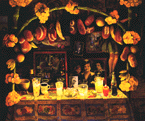FOR ANYONE FAMILIAR with daily life as it is
lived in Mexico City, the
paintings of Elena Climent produce an instant shock of recognition. This is
not to say that she depicts any of the famous "monuments" of the city. Nor
does she present us with anything that could be called (touristically
speaking) "typical." There are no market vendors or watermelons in her
paintings. What she describes (in a true but never photo-realistic way) is the
interior structure of the life of middle class Mexicans. We virtually never
see their faces; we only perceive them through the things they leave
behind-on kitchen tables, on pantry shelves, in the niches where Christmas
creches are set up or in the intimacy of the bed and dressing room. Climent's
paintings palpitate with life or, rather, are redolent with the warmth of the
existence of people who never consciously do anything "artistic" but whose
everyday behavior (the way they set a table, arrange a store window or
decorate a home altar) evidences an innate reverence for the appearance,
shape and color of things. Climent paints simple objects but she does not
glorify or dignify them. There is an intensely personal alliance between the
artist and the things she records on her canvases. She is happy and at ease
with what she paints and the act of registering these objects gives her
intense pleasure. Indeed, one can almost sense that if the viewer is pleased
with them their creator would be happy but it would not necessarily pain her
if the things she paints were to
be dismissed as "unimportant" by someone.
Elena Climent's work might
almost be called "anti-nostalgic." The kitchen pots and pans she paints are
more likely to be made out of plastic than earthenware. The children's toys
that clutter her vitrines are not the fanciful animals or traditional dolls
that we might see in paintings by Rivera or Maria lzquierdo. They are cheaply
made recreations of television wrestling heroes or knock-off varieties of
American Barbie dolls. A shelf painted by Climent might contain a
chromo-lithograph of the Virgin of Guadalupe and the Santo Niño de Atocha
alongside a can of hairspray or a shocking pink lipstick. It is what these
objects say about life today in a specific place-as well as the natural
affinities of their shapes and colors that fascinates this gifted artist.










